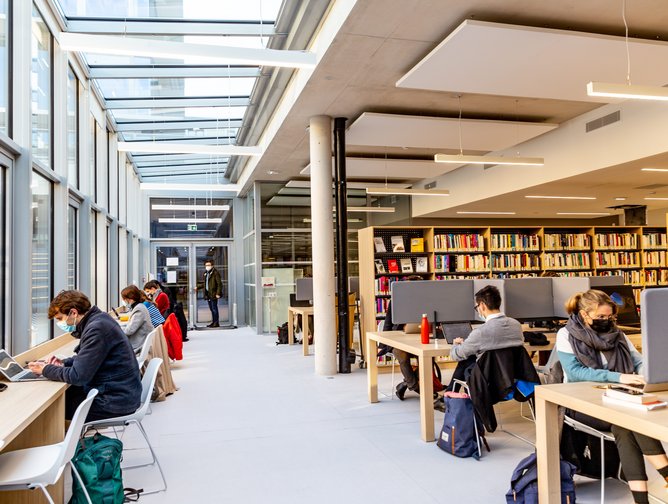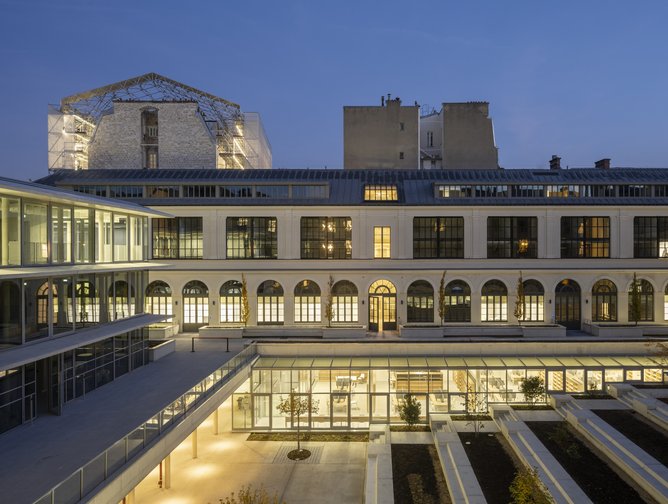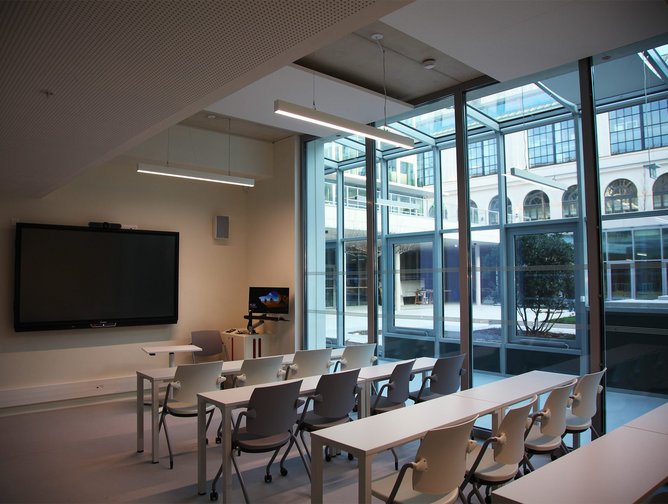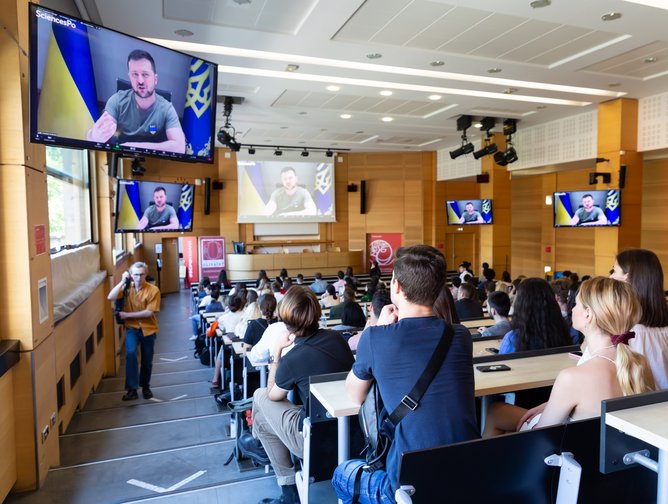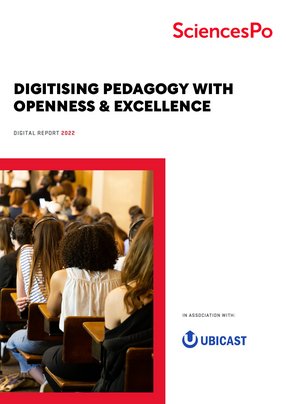SCIENCES PO: Digitising pedagogy with openness & excellence
On Wednesday 11 May 2022, Ukrainian President Volodymyr Zelensky conversed for more than an hour with several hundred students, including many from Sciences Po University. Across France, dozens of auditoriums were opened, and tens of thousands of people were able to follow, in person or online, this unprecedented exchange.
"Today is the seventy-seventh day of the large-scale war against Russia, which began in the seventy-seventh year after the end of the largest war in Europe," began President Zelensky, live from Kyiv. Rather than a prepared speech, he wished to ask questions to the students “to have a real dialogue”.
This level of discourse, plugged into the major and pressing political issues of the planet, is standard practice for Sciences Po, a world-class research university based in Paris. Its reputation has been – and continues to be – built on an international dimension since its formation in 1872, with 150 nationalities represented and 49% of students coming from outside France.
Sciences Po gets its name from ‘political science’ and is part of the social sciences, itself emerging from the term that was formerly used to refer to the field of sociology, the original "science of society", established in the 19th century.
Students from 480 global partner universities can study at one of Sciences Po's seven campuses as part of an exchange programme, with students fully integrated into the wider student body.
Jean-Pierre Berthet is Chief Digital Officer for the Institute for Skills and Innovation of Sciences Po and his responsibility is to deliver the best teaching and learning experience for students and teachers. Originally from an engineering background, Jean-Pierre Berthet joined the institute five years ago following his role as counsellor for pedagogy and technology in the ministry of higher education.
Working in tandem with Jean-Pierre Berthet is Stéphane Auzanneau, Chief Information and Digital Officer and Executive Commitee member. Stéphane Auzanneau is also responsible for driving the digital campus of CIVICA, the European University of Social Sciences, uniting eight leading European higher education institutions. A Director since 2007, he has led the adoption of a digital campus for the entire school. Working closely with Berthet, he implements global digital services and has worked at Sciences Po for nearly 23 years.He was before Sciences Po Dean of Students & Registrar.
Making technology invisible
To provide the best teaching and learning experience, Sciences Po values pedagogy, technology, and spaces. Innovation through technology is vital to pedagogy and how to change the way people teach and learn. In terms of digital transformation, this also includes the enhancement of physical spaces on campus and virtual spaces when using digital services.
“When we implemented the very first digital services, the aim was to make them as simple and efficient as possible, at the highest quality and level of support we can offer,” says Auzanneau.
This is particularly crucial with so many international students, where it is critical to have simple tools that are very user-friendly.
Auzanneau adds that their strategy is “making technology invisible” to seamlessly integrate digital services into the ecosystem in sync with the “general habits people are used to”.
“The interaction between digital spaces and physical spaces is really key when we welcome our student faculty or onboard in our campuses. It must correspond with what we promote from a digital point of view, because users will switch very quickly from one side to the other.”
In addition to this synchronisation of pedagogy and technology, Berthet adds that the other game they must play is like chess, where they must “see the future coming”.
To ensure they are able to innovate with the best technology, research and development is needed to check the latest software and hardware, and to improve the flow of information within the ecosystem: “We need to evaluate these different points and make proof of concepts with teachers,” adds Berthet.
Citing the pandemic with the COVID crisis, Berthet states that Sciences Po was “able to put all of [its] courses online in one week”, but that “was just because myself, Stéphane and our teams were preparing this ecosystem for more than a year”.
The other mission is to share experience not just between the people inside SCPO, but also outside with other universities all around the world.
“For instance, we've got an international workshop in mid June, where we have invited colleagues from the United States, Singapore, England, Switzerland and more so we can share our experience and hear about the challenges of others,” says Berthet.
Milestones of success in the technology programme at Sciences Po
Crucial to the successful adoption and continuous growth of digital services in the SCPO technology programme is the implementation of dialogical platforms – which must be strong and reliable – and to retrieve information from the faculty and structure it in a way that can be integrated efficiently.
“We are quite advanced in the services for students and also services around our library, but we need to make the origins of data coming from faculty more smooth and organised, in order to integrate them in our platforms.
“That’s why we co-design activities with our colleagues around the faculty, not only in the courses we offer services to students, but we have also to take into account the human resources services and the financial services, which are not always designed for a higher institution,” says Auzanneau.
Berthet adds that SCPO “works with large companies like Google, Panasonic, Promethean, Ellucian and Zoom, as well as specialised Edtechs like Ubicast, Wooclap, Whaller and Appscho and with open source components”.
“For instance, our learning management system is open source. We work with the likes of Ubicast too, utilising their specialised video solutions for education directly inside our LMS. It’s very important to have a good mix between all these different partners,” he explains.
How digitisation is evolving books
In a community that still cherishes physical books, there is an ongoing transition between digital textbooks, interactive video, and collaboration inside books, such as the capacity of students to annotate themselves and share the annotations with other students, and the capacity as well for teachers to assign activities to students in parts of the book.
“We enhance the experience of the learner, so they’re not just watching video, but interacting with it. And, with digital textbooks, technology gives students the ability to print certain sections or articles quickly and easily,” says Berthet.
It’s also a question of devices the students use and adjusting the reading experience to tablets rather than desktop, for instance.
Auzanneau adds: “We offer a printing service that the students and faculty still use very widely. Before the pandemic, we were printing about 10 million pages of A4. And now halfway through the year, we are at 5 million. So it's still very important.”
“We need a combination between going digital and having the possibility to use paper and write things, because the way of thinking and the way the brain works depends very much on this very pragmatic and practical interaction one has with staff, academic papers, textbooks and surfaces in the digital and virtual spaces. So I think it's still very difficult to say in which direction it'll go in future, because even amongst very young students, digital natives, they may still use books.”
Berthet adds another example, citing having “3, 4, 5 digital books on the screen at the same time is different to using five textbooks at once. It's also a question of the moment you’re using them”.
Physical spaces enriched by digital experiences
To celebrate their 150th anniversary, Sciences Po enlisted a top architect to design a new campus in the centre of Paris.
“We can gather all our research departments in the same place, whereas before that, we had more than 20 locations in Paris and it was difficult for them to meet to work together, but also to live together. Now researchers, teachers, students, and staff can live and work together,” says Berthet.
In the Sciences Po classroom, there are digital opportunities to work with different kinds of tools such as big interactive displays and to write things on the walls.
“The new campus is very special. It is one of the most attractive campuses in Western Europe and combines history and technology. We try to provide the best equipment such as a TV studio and a radio studio for our school of journalism, a video recording studio, an innovation building, a research library and more. And all standardised across the different installations so technology functions across lecture rooms,” says Berthet.
Based on a living lab created four years ago, the ecosystem is fine tuned and based on a charter to ensure everything is run sustainably.
Alumni includes heads of state
“To have double degrees with many universities all over the world is very important. We also have a fantastic network in terms of alumni – over 90,000 of them. Some of them are Presidents or former Presidents, ministers of different states, or they're also working in prestigious organisations as well,” says Berthet.
Social sciences offer many different career paths for when students embark on post-graduate life. These include academia, but also public sectors, private sectors, and international roles, such as working in European institutions.
“We have a very good career support team for students,” says Berthet.
“We have nine job fairs every year and plenty of preparation workshops, numbering around 200. Then more than 10,000 internships. We also have seven specialised schools with strong relations with institutions and companies.
Auzanneau adds that “big French or international banks” are frequent destinations, as well as the French administration or European institutions, NGOs, journalistic roles and, as part of the European Union, workforces around Europe, who take on students after their studies.
A truly international University
Berthet is keen to mention that the university is committed to removing barriers to higher education, explaining: “Access to university is really in the DNA of SCPO, and it started 20 years ago with one of our former directors, Richard Descoings. We have a specific programme, the Equal Opportunity Programme, and we're working with 166 high schools over France and overseas, helping the students with their preparation for higher education and to come to SCPO. The objective is to have 200 partners in high schools to cover all the French territory.
“It’s very interesting to work with these students. They're really amazing. We are spending around €11 million each year for diversity, scholarship and financial aid to students; 35% of them don't pay any student fees. We also have specific programmes for student refugees, such as those coming from Ukraine at the moment.
Berthet adds that it is important to prepare “future managers that are representative of as many societies as possible”. Why? Because “talent is everywhere, and our job is to help find them and to help them to transfer into higher education”.
Auzanneau concludes: “I say to all prospective students: if you have the talent, and you have the will, we will do everything possible to support you. Our system is adapted to the income of families throughout Europe.”
It is a very selective process however, with standards high. Technology aids their search for the best talent, with admission interviews held not only in Paris, but also in several cities in Europe and the Americas as well.
“We put all these admission interviews online, and it represented 4,500 in two months.
“It worked perfectly for students who are all over the world to have the possibility to interview with two different examiners from their home or their high school, for instance. We can remove the stress of going to a specific place, via a plane or train or hotel, and then to a specific building for that. The interviews are more comfortable for them,” says Berthet.
In terms of social inclusiveness, Auzanneau says: “I'm very proud of this new system we implemented last year, because it is an example of digital services increasing student confidence in order not to self-censor themselves.”
According to Berthet, “it's very simple for examiners to use it”. “Our digital services are simple and easy to use, helping people all over the world, without any problem. This is what we mean by making technology invisible.”
“What is our next challenge? To combine digital and sustainability transformations, not only inside our courses to prepare our students for these crucial challenges, but also at the heart of our daily practices.”
